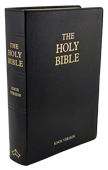The Holy Bible – Knox Translation
The First Epistle of the Blessed Apostle John
|
Chapter 5
|
1
Everyone who believes that Jesus is the Christ is a child of God, and to love the parent is to love his child.
2
If we love God, and keep his commandments, we can be sure of loving God’s children.
3
Loving God means keeping his commandments, and these commandments of his are not a burden to us.
4
Whatever takes its origin from God must needs triumph over the world; our faith, that is the triumphant principle which triumphs over the world.
5
He alone triumphs over the world, who believes that Jesus is the Son of God.
6
He it is, Jesus Christ, whose coming has been made known to us by water and blood; water and blood as well, not water only; and we have the Spirit’s witness that Christ is the truth.✻
7
Thus we have a threefold warrant in heaven, the Father, the Word, and the Holy Ghost, three who are yet one;✻
8
and we have a threefold warrant on earth, the Spirit, the water, and the blood, three witnesses that conspire in one.✻
9
We are ready to trust human authority; is not divine authority higher still? And we have that higher divine authority for this; God has borne witness to his own Son.
10
The man who believes in the Son of God has this divine attestation in his heart; the man who does not believe in the Son treats God as a liar; although God himself has borne witness to his Son, he has refused to believe in it.
11
And what is the truth so attested? That God has given us eternal life, and that this life is to be found in his Son.
12
To keep hold of the Son is to have life; he is lifeless, who has no hold of the Son of God.
13
There is my message to you; be sure that you have eternal life, you who go on believing in the name of the Son of God.
14
Such familiar confidence we have in him, that we believe he listens to us whenever we make any request of him in accordance with his will.
15
We are sure that he listens to all our requests, sure that the requests we make of him are granted.
16
If a man knows his brother to be guilty, yet not of such a sin as brings death with it, he should pray for him; and, at his request, life will be granted to the brother who is sinning, yet not fatally. There is a sin which kills; it is not over this that I bid him fall to prayer.✻
17
Sin may be wrong-doing of any kind; not all sin is fatal.
18
The man who has been born of God, we may be sure, keeps clear of sin; that divine origin protects him, and the evil one cannot touch him.
19
And we can be sure that we are God’s children, though the whole world about us lies in the power of evil.✻
20
We can be sure, too, that the Son of God has come to us, and has given us a sense of truth; we were to recognize the true God, and to live in his true Son. He is true God, and eternal life.✻
21
Beware, little children, of false gods.


